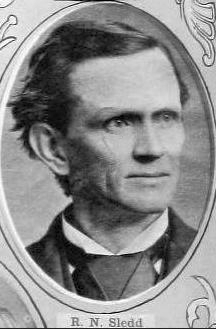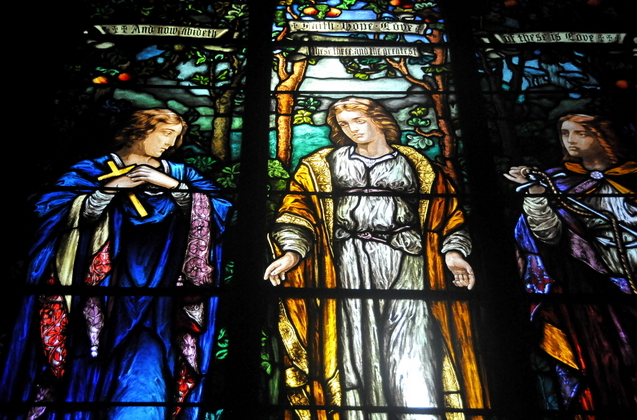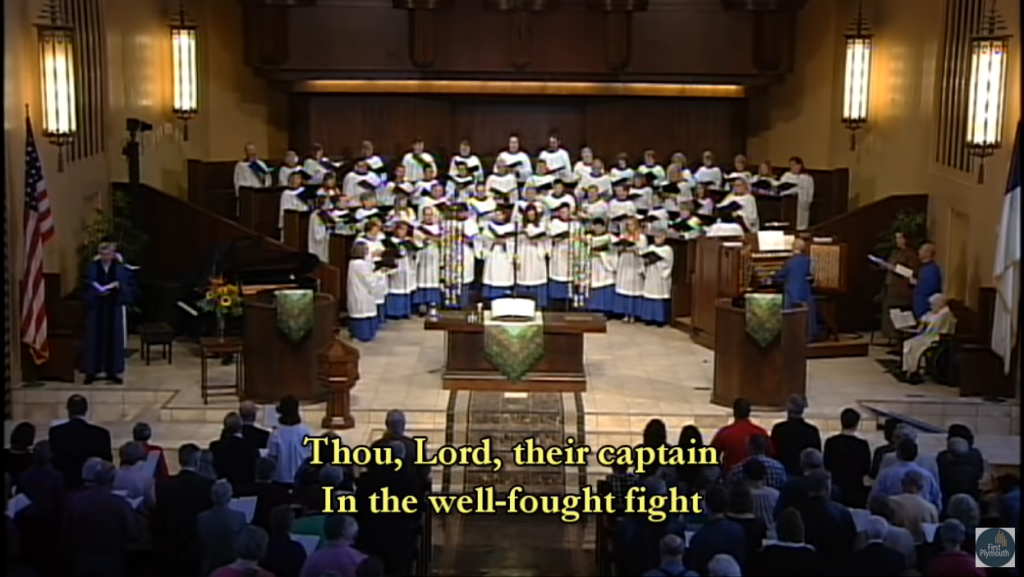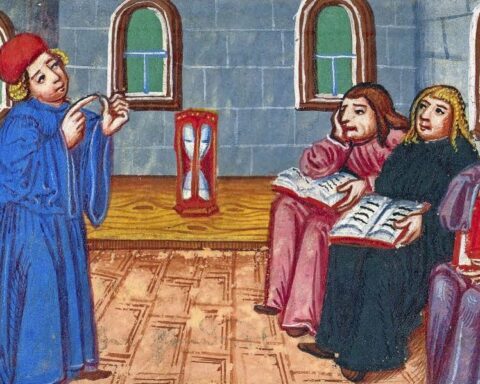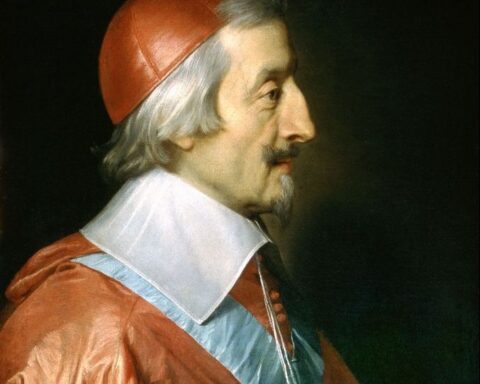Editor’s note: The following is extracted from True Heroism and Other Sermons, by R. N. Sledd (published 1899).
“And now abideth faith, hope, charity, these three; but the greatest of these is charity.” — I Cor. xiii, 13.
We have in this text a revelation of the eternal future. That which is in part has been done away. Our partial knowledge, which we have acquired by looking through a glass darkly, is superseded by direct unclouded vision. That which is perfect is come, and we see face to face, and know even as we are known.
It is not, however, a revelation of the external glory of that future. There is nothing in the text or context concerning the “city which has foundations, whose maker and builder is God;” nothing of the throne of fire, the central seat of the divine majesty; nothing of the shining ranks of glorified intelligences, of their associations and employments, of the crowns they wear, the palms they bear, and the songs they sing.
Yet there are few passages that give us a clearer view of the inner life of the redeemed, or that show more conclusively the identity of that life with the spiritual life begun on earth; in each stage of being there is the same fundamental condition of life, faith; the same inner working and outreaching of that life, hope; and the same manifestation and fruitage of that life, love. The life therefore is one, only with this difference: in that higher state faith is absolute, hope is unclouded, and love is supreme.
I. THE ETERNAL PERMANENCE OF THESE THREE GRACES.
It is a mistake to suppose that faith and hope belong only to the present — a mistake by no means uncommon. There are many religious beliefs having other sources than the word of God, that are as deeply rooted in the popular mind as if they were written on the pages of Inspiration so plainly that there could be no mistake concerning them.
Especially has poetry been a fruitful source of doctrinal error. The heart is more impressible than the intellect; sentiment is stronger than reason. He had a correct and at the same time a profound view of human nature, who said, “Let me make the ballads of a people, and I care not who makes their laws.” Give to any man the exclusive control of the hymnology of the church and Sunday school and he will do more to mould the religious opinions and life of the masses of the people than all our schools of theology. All our life, for example, we have been singing these words of Charles Wesley:
“The atonement of thy blood apply,
Till faith to sight improve,
Till hope in full fruition die,
And all my soul be love.”
And the no less beautifully expressed sentiment of Watts concerning love:
“This is the grace must live and sing
When faith and hope shall cease,
Must sound from every joyful string
Through the sweet groves of bliss.”
We have heard sermons on the passage before us which were but an elaboration of this poetic fancy; in which the superiority of love over faith and hope was argued chiefly on the ground that love is eternal while faith and hope are transitory. But it is not so written here. On the contrary the apostle plainly affirms their permanence. “And now abideth faith, hope, charity;” the one is as enduring as the other. All three alike survive the wreck of the body and spring eternal in the human spirit.
God in His wisdom, conferred many splendid gifts on believers in the apostolic age; to one He gave the word of wisdom; to another the word of knowledge; to another the gift of healing; to another the working of miracles; to another prophecy; to another the discerning of spirits; to another the gift of tongues; to another the interpretation of tongues. But these gifts were all provisional and transient. They were designed to enable the church to meet the emergencies of her infancy. In process of time they shall all fail, and along with these, all those appliances of church polity, doctrinal formulas, ordinances and means of grace the purpose of which is the unfolding and perfecting of the life of God in the soul: “And now,” when these have done their work and have all passed away, “faith, hope, charity, these three” abide in perpetual permanence.
We find in the nature of faith and hope, satisfactory proof of their existence in the eternal state.
1. Faith is the strong conviction, the demonstration to the soul of the existence of things unseen — a conviction so clear and strong that those things affect the mind, heart, life, as truly, and often more power fully, than if they were present to the senses. In this life it embraces all things unseen and spiritual. The existence, attributes, and government of God, the being of angels and devils, the mediation of Christ, the Holy Ghost and His offices, the resurrection of the dead, the judgment of the last day, heaven, hell, immortality, are all known to us and become operative on our character and life only by faith. When we are advanced to that higher state many of these things will cease to be objects of faith. They will have become objects of sight. Job says of God, ” Whom I shall see for myself, and mine eyes shall behold;” John says of Christ, “When He shall ap pear we shall be like Him, for we shall see Him as He is;” we shall enjoy the goodly fellowship of angels; salvation with eternal glory shall be a blessed fact; the songs of heaven will be heard; its worshiping, triumphant hosts will be seen; its mighty joys of which we have so often sung, and for which we have longed, will become a blissful experience.
But can any one suppose that the soul will leap, as by a single bound, to the comprehension of all things now unseen. Transcendantly glorious will be the revelations immediately following its release from the limitations and infirmities of the body. Eye hath not seen, ear hath not heard, neither hath it entered into the heart of man to conceive the things that will then greet its vision. But is there nothing beyond? Will the first sweep of its liberated powers compass all the length and breadth and height and depth of God’s creative power, His providential administration, and His redeeming love? Will it at once, or ever, settle down in the conviction that it sees all that is ever to be seen, knows all that can ever be known, experiences all that can ever be felt? The angelic powers, who have dwelt in the light of heaven through all the ages of their being, are still students of the manifold wisdom and goodness of God, and will be forever. And the glorified spirit, whatever its exaltation and the range and grasp of its powers, will carry with it through every stage of its being the conviction that there are still things unseen and unknown — an expanse of glory between itself and the Infinite the exploration of whose wonders will occupy all the ages of eternity. Such a conviction, belonging as it does to all intelligent finite beings on earth and in heaven, is of the essence of faith as defined by St. Paul.
But faith, in a more popular sense, is a loving, trustful clinging of the soul to God in Christ — a resting on Christ, and in Christ, as the only foundation and pledge of its safety and happiness. Its language is: “For me to live in Christ,” and its deepest yearning is to “know Him, and the power of His resurrection, and the fellowship of His sufferings, being made conformable to His death.” Christ is the head: the church is the body: all believers are members of that body and united to Him, and from Him deriving all spiritual life, activity and enjoyment. Will all those blessed pulsations from the heart of Jesus that so invigorate and thrill the spirit now come to an end? Will the hand or the foot ever say to the head in the life to come, “I have no need of thee”? Will the soul, in its sweet consciousness of safety, and in the joy of its triumph, ever lose its sense of dependence? True the struggle is over; the danger is past; the victory is won; but, as it ungirds itself for the rest after the battle and lays down its armor, will it lay down also its trust in Jesus? On the contrary, its view of its dependence on Him will be clearer than ever before. He will be seen as the only bond of union and source of the safety and joy of the entire virtuous universe. “It pleased the Father by Him to reconcile all things to Himself… whether they be things on earth or things in heaven.” Mediation is an essential principle of the divine administration. Jesus Christ is the embodiment of that principle. In His office and work on earth and in heaven He gives it efficient and glorious expression. Heaven can no more do without Him than the solar system can do without the sun. Its unfallen ones in adoring gladness acknowledge their obligation and express their gratitude in the songs they sing. John heard them, ” Saying with a loud voice, Worthy is the lamb that was slain to receive power, and riches, and wisdom, and strength, and honor, and glory, and blessing,” and from the whole universe came the responsive shout, “Blessing, and honor, and power, and glory, be unto him that sitteth on the throne and unto the lamb forever.” It is a mistake to suppose that mediation will come to an end with the probation of the human race. As He is the mediator of grace now, so will He be the mediator of glory then. As in and through Him we are reconciled to God and saved from sin now, so in and through Him our reconciliation will be perpetuated and confirmed, and our souls enriched with the ever accumulating treasures of the heavenly inheritance. And to cease to look to Him in loving, perfect trust then, will work the destruction of the soul’s happiness no less surely then, than will unbelief condemn and destroy us now.
As long, then, as there are things and truths unseen, unknown, and as long as there is a sense of dependence and trust in God, and in Jesus Christ the one mediator, so long will faith abide.
2. Hope is commonly, but correctly defined as the desire of some good accompanied with the expectation of obtaining it. Its objects, like those of faith, are things unseen. “Hope that is seen is not hope: for what a man seeth why doth he yet hope for. But if we hope for that we see not then do we with patience wait for it.” We know what an important part this grace plays in the economy of salvation. The hope less soul never comes to Christ — never receives forgiveness, never rejoices in His love. Only the hopeful, those who desire His mercy and patiently wait for it, are accepted and crowned with His blessing. At every step of the Christian life, this grace is of essential importance. It strengthens us in our weariness, cheers us in our discouragements, and comforts us in our sorrows. It inspires us with courage to brave the difficulties and endure the hardships of the way. Take away this hope and all Christian activity and joy would come to an end, and the world would fall back into the wretchedness and gloom of utter despair.
In the future life, perhaps, all that with our limited knowledge we now hope for will be at once realized. But when the apostle affirms that it hath not entered into the heart to conceive the things that God hath prepared for them that love Him, he more than intimates that beyond all present thought there are treasures of good that will enkindle desire, and promises of good that will keep expectation alive forever. There will be constant outlookings and outreachings of the soul after deeper, higher, grander manifestations of the goodness and glory of God. To whatever heights we may ascend there will be others still towering above us and inviting us onward and upward forever.
3. No question is raised concerning the perpetuity of the grace of love. All concede that there can be no spite or ill will, no envy or jealousy, no pride or arrogance among those who inherit eternal life. Love supreme, perfect, all pervasive, warms, and fills, and thrills every glorified spirit. Its light is in every eye; its gladness sits on every brow; its language is on every tongue. It breathes in every song and shout of praise. He who sits on the throne is love. The glory that lights up the eternal city, and, streaming out through its wide open gates, irradiates the remotest parts of God’s virtuous empire with heavenly splendor, is the glory of love. Whatever else may pass away, “love never faileth.”
These three graces, then, faith, hope, and love, are carried over into the future life; faith without doubts, hope without shadows, and love without alternations of coldness or wanings of its vestal fires.
In these graces we discover both the possibility and the pledge of the soul’s eternal progress. The soul is made for activity, growth, the constant unfolding of its powers, and their constant enrichment with the ever new and increasing treasures of truth and goodness. Heaven is pictured to our faith as a scene of ceaseless activity, not a condition of absolute quiescence, or a state in which its happy subjects will be forever exempt from all necessity of action. Action is the law of our being and the condition of our happiness. Condemn a man to absolute inactivity — cut him off from all prospect of ever seeing, hearing, knowing, enjoying anything more, and though in the midst of the most splendid surroundings he would be utterly wretched. We have no reason to believe that this law will be repealed or this condition annulled in the world to come. Heaven would cease to be heaven if the soul, endowed as it is with the grandest capabilities and finding its noblest joys in their exercise, must fold its wings like the caged eagle and while away the dreary monotony of its being in absolute quietude. Rather as that bird, when set at liberty, plumes its pinions, fixes its eye upon the sun and soars away in majestic circlings, rising higher and higher until lost to human gaze, so will the redeemed spirit, freed from the limitations and encumbrances of its earthly state, rise upward and go forward in all wisdom and goodness forever.
Faith, hope, love, are the elemental principles underlying all real progress in this life. The belief in something better, the hope of obtaining it and the love of its promised good nerve us to that effort needful to secure it. Take away this belief, hope, and love from man, and what motive is left to prompt his activity? The faithless, hopeless, loveless soul never goes forward, crosses no Red Seas, traverses no deserts, fights no battles, gains no victories, wins no Canaan. So in the life to come the soul’s conviction of things still unseen and its hope of obtaining and enjoying them will inspire and energize its powers for the loftiest efforts. Unfettered by the flesh and unclouded by sin, it shall ever be acquiring new views of the perfections of God, of the mysteries of providence and redemption, of the wonders of creative power and goodness. Deprive it of either of these graces, and you cut it off from this prospect of advancement and glory.
II. THE COMPARATIVE EXCELLENCE OF THESE GRACES.
” The greatest of these is love.” Preeminence is accorded to love. All are eternal; but love is chiefest among the eternal.
1. God is love. This is His nature and His name. Every divine attribute, in itself considered, and in all its manifestations, is a modification and expression of His love. What is thus true of His essential being is no less true of His administration both in providence and grace. He cannot deny Himself, and there fore cannot act, in any particular, at any moment, in any place, towards any being, inconsistently with love. His administration in its minutest particulars as well as in its sublime entirety has its origin and impulse and its limitations and issues in a love as boundless and eternal as His being.
Moral excellence in the creature does not consist in what he has, or what he is capable of; nor in what he believes, or what he hopes to attain; but in his likeness to God; in the conformity of his being and life to the will and image of God. Faith apprehends this divine excellence and in conjunction with hope uses the means revealed for its attainment; but love is the realization; it is the likeness of God attained. He that loveth is like God; he is united to Him; he is one with Him in mind, heart and will, and in all the movements of his sanctified activities. To be full of love is to be full of God; “He that dwelleth in love, dwelleth in God, and God in him.” The grace that is most godlike is the greatest and most excellent that can adorn and glorify the character and life of the creature.
2. Love is the principle of self-bestowment. In the work of redemption this truth finds its most complete exemplification. “God so loved the world, that He gave His only begotten Son, that whosoever believeth in Him should not perish, but have everlasting life. God commendeth His love toward us, in that, while we were yet sinners, Christ died for us.” Moved by nothing but love, He gave Himself for us; He gave Himself to reproach, suffering, sorrow, and death, to rescue us from the power and pollution of sin and the ruin of hell, and exalt us to the thrones of heaven.
We find illustrations of this truth around us in common life. We see it in the devotion of the wife to the husband; in the consecration of her life to his happiness; in her clinging to him, toiling for him, and weary watchings for him, even though he be bankrupt in fortune and wrecked in character and forsaken by the world. We see it too in the fond mother’s care, and toil, and sympathy, and utter self-surrender for her children. Their happiness is her happiness, their sorrow is her sorrow. So in spiritual life. Where the love of God reigns in the soul, there is devotion to the good and welfare of others. There is no seeking of one’s own advantage to the detriment of others: no purpose to have and to hold anything good for self alone. It is the invariable and universal characteristic of love that she “Seeketh not her own,” but the good of others, and in others’ good finds her deepest and most abiding satisfaction.
3. Faith and hope acquire; love distributes. They plant the seed, watch over, protect, and cultivate the plant; but love is the blush and beauty of the flower and the fragrance that loads the air. They drive the machinery that forces the water into the reservoir; but love, by ten thousand little channels, carries the streams of life, health, and comfort to all the homes of the great city. The latter cannot live without the former; the former are useless without the latter. They are inseparably connected, and dependent one on the other. Yet it is better, greater, grander to give than to receive.
Love not only bestows, and in bestowment contributes to the happiness of others, but at the same time multiplies its own joys. The parent is happy in the happiness of the child. The husband’s joy doubles the joy of the wife. Love gives the one joint ownership in all the gladness of the other. Transfer the thought to the heavenly state. We shall be unspeakably happy in our personal salvation, in our nearness and likeness to Christ. The vision of His glory, His word and look of loving welcome, and the sweet consciousness of eternal safety will transport us with “wonder, love and praise.” But this is not all of heaven. There is a great multitude which no one can number every one of whom is as happy as we are. And loving each other perfectly the blessedness of each one is the heritage of every other one. “He that overcometh shall inherit all things; ” there is no division of the Father’s estate among the myriads of His children. Each one inherits the whole of it. Love makes your glory mine, and my glory yours. Each one’s joy is thus multiplied by all the joys of all the redeemed. Truly “it doth not yet appear what we shall be” or
“What height of rapture we shall know
When round His throne we meet.”
The place of love in the divine nature and administration, its office and work as the principle of self-bestowment, and its multiplication of our joy by all the joys of all redeemed, are facts that entitle it to preeminence over all other graces. ” And now abideth faith, hope, love, these three; but the greatest of these is love.”
